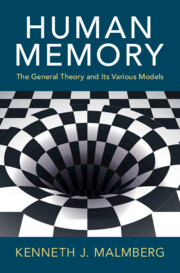Book contents
- Human Memory
- Human Memory
- Copyright page
- Contents
- Figures
- Foreword
- Preface
- Acknowledgments
- Chapter 1 Introduction
- Chapter 2 Models of Cognitive Control, Storage, and Retrieval
- Chapter 3 Search and Detection
- Chapter 4 Sequential Effects
- Chapter 5 Forgetting
- Chapter 6 Differentiation
- Chapter 7 Knowledge
- Chapter 8 Modeling the Consequences of Testing Memory
- Chapter 9 The Buffer Model Revisited
- References
- Index
Chapter 6 - Differentiation
Published online by Cambridge University Press: 17 January 2025
- Human Memory
- Human Memory
- Copyright page
- Contents
- Figures
- Foreword
- Preface
- Acknowledgments
- Chapter 1 Introduction
- Chapter 2 Models of Cognitive Control, Storage, and Retrieval
- Chapter 3 Search and Detection
- Chapter 4 Sequential Effects
- Chapter 5 Forgetting
- Chapter 6 Differentiation
- Chapter 7 Knowledge
- Chapter 8 Modeling the Consequences of Testing Memory
- Chapter 9 The Buffer Model Revisited
- References
- Index
Summary
In the 1980s there was surge of interest in modeling human memory. One of the most successful lines of research investigated recognition memory, and several important models were developed. Testing of the models was conducted, leading to a consensus that there were problems with all extant models. This led to the development of more complex models that assumed that differentiation was an important process in human memory. The findings that challenged then extant models are presented, and the retrieving effectively from memory (REM) framework describing differentiation is discussed in detail.
- Type
- Chapter
- Information
- Human MemoryThe General Theory and Its Various Models, pp. 144 - 167Publisher: Cambridge University PressPrint publication year: 2024

